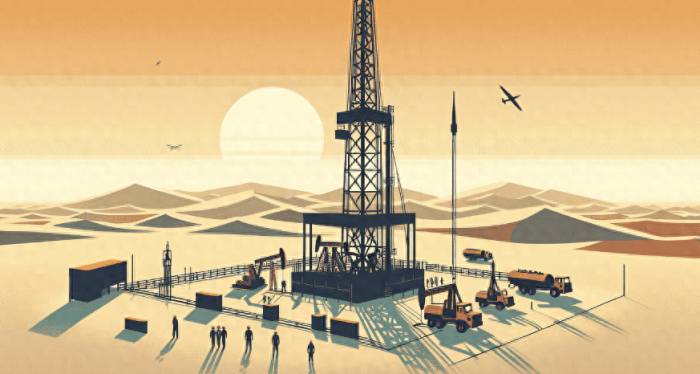Analysts believe that if one were to focus solely on fundamentals, "betting against crude oil is the only solution."
On Monday, both crude oils plummeted by over 4% during the day, with WTI crude oil approaching the $70 mark and Brent crude oil falling to around $75.
The market attributes the "unfavorable start" of oil prices this week mainly to Saudi Arabia, a major oil exporter, significantly reducing its prices. Additionally, an increase in OPEC production has offset supply concerns triggered by the escalation of geopolitical tensions in the Middle East.
Following an attack on a Red Sea vessel by the Houthi militants in Yemen, geopolitical risks in the Middle East intensified, causing both WTI and Brent crude to rise by more than 2% in the first week of 2024.
Last Sunday, increased supply and competition with rivals prompted Saudi Arabia to lower the official selling price of its flagship Arab Light crude oil to Asia in February to the lowest level in 27 months.
John Evans from the oil brokerage firm PVM stated, "Oil observers have reason to question whether Saudi Arabia's price cut is not only to quell disruptions from non-OPEC+ supplies but also to quell disruptions from within OPEC+ itself."
Data also shows that before Saudi Arabia made this decision, fund managers in the oil market significantly increased their short positions in Brent and WTI crude, with an increase ranking as the second-highest since 2017.
A survey by foreign media last Friday found that OPEC's oil production increased in December last year due to increased oil production from Iraq, Angola, and Nigeria, which offset the ongoing production cuts from Saudi Arabia and other members of the broader OPEC+ alliance.
A survey by foreign media tracking a series of transportation, flow, and production data showed that OPEC's daily oil production last month was 27.88 million barrels, an increase of 700,000 barrels per day compared to November last year.

Two sources in the survey believe that Angola's production increase is one-time and may not be sustainable into January, while Iraq still has a significant amount of production shut in due to the ongoing halt of northern crude oil exports through Turkey.A survey has found that Iran reduced its oil exports in December last year, with production slightly decreasing from the five-year high reached in November. Despite ongoing U.S. sanctions, Iran achieved one of the largest production increases within OPEC in 2023.
IG analyst Tony Sycamore stated:
"If we focus solely on the fundamentals, including increased inventories, increased OPEC/non-OPEC production, and Saudi Arabia's reduction of official crude oil prices, there seems to be no alternative but to bearish on oil. However, this does not take into account the undeniable resurgence of geopolitical tensions in the Middle East, which could imply that there is limited downside potential for oil prices."
Furthermore, Wall Street anticipates that oil prices will face more bearish challenges in the future, with major banks now downgrading their oil price forecasts for this year. Francisco Blanch, head of global commodities and derivatives at Bank of America, said, "There is a lot of supply, and demand is slowing down. Our interest rates have risen significantly, which indeed slows economic growth. I believe that these factors combined are contributing to the decline in oil prices."
U.S. Secretary of State Blinken held more talks with Arab leaders on Monday as part of diplomatic efforts to prevent the further spread of the Gaza war. The conflict has already sparked violent incidents in the Israeli-occupied West Bank, Lebanon, Syria, and Iraq, and has also led to Houthi attacks on the Red Sea shipping lanes.
Vandana Hari, founder of oil market analysis provider Vanda Insights, said, "Tensions in the Red Sea are the only 'counterbalance' to the downside of oil prices, although this force is relatively weak and intermittent."
Another factor supporting oil prices is the shutdown of the largest oilfield in Libya. The National Oil Corporation of Libya announced earlier that the Sharara oilfield has been under force majeure since January 7 due to a blockade by protesters. Negotiations are ongoing, and production is expected to resume as soon as possible.